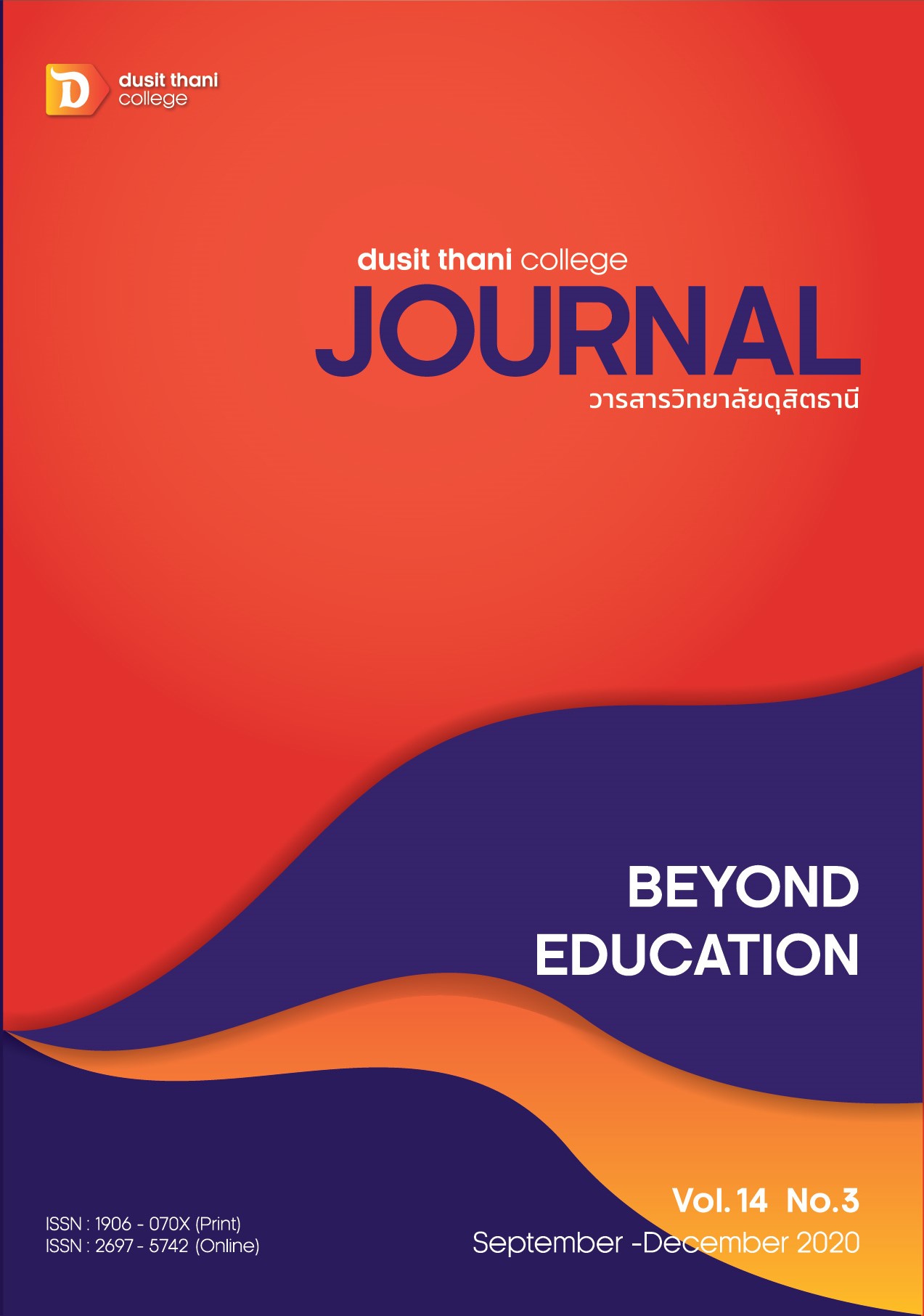The Effects of MICE Venue Management on Venue Performance in Thailand through Strategic Management and Sustainable Management
Main Article Content
Abstract
The objectives of this research are 1) to examine the effect of MICE venue management in Thailand on strategic management 2) to examine the effect of MICE venue management in Thailand and strategic management on sustainable management and venue performance 3) to examine the effect of MICE venue management in Thailand on venue performance through strategic management and sustainable management and 4) to examine accordance of a model of MICE venue management in Thailand that effects to a venue performance through strategic management and sustainable management and empirical evidence. This research was conducted in quantitative methodology. The quantitative data were collected from 148 out of 238 MICE venues nationwide. The confirmatory factor analysis and the structural equation model were used to analyze the data. The results of the model analysis showed that the model based on assumptions were in harmony with the empirical data by c2 = 31.31 at the 0.05 level of significance. The p-value of c2 = 0.73, c2/df = 0.84, CFI = 1.00, GFI = 0.99, AGFI = 0.99 and RMSEA = 0.00. The results from hypothesis-testing shows that 1) MICE venue management has a direct effect on strategic management 2) MICE venue management and strategic management has a direct effect on sustainable management 3) MICE venue management strategic management has a direct effect on venue performance 4) MICE venue management has a direct effect on venue performance through strategic management and sustainable management.
Article Details
Article Screening Policy
- All research and academic articles to be published must be considered and screened by three peer reviews in the relevant field / article.
- All articles, texts, illustrations and tables published in the journal are the personal opinions of the authors. Editors don't always have to agree. And no responsibility whatsoever is the sole responsibility of the author.
- The articles to be published must never be published. Where did you first publish? And not in the consideration of other journals If the audit found that there has been a duplicate publication It is the sole responsibility of the author.
- Any article that the reader sees as being plagiarized or impersonated without reference. Or mislead the work of the author Please let the journal editor know it will be your greatest blessing.
References
Amaratunga, D., Kulatunga, U., Liyanage, C., Hui, E. C., & Zheng, X. (2010). Measuring customer satisfaction of FM service in housing sector: A structural equation model approach. Facilities, 28(5/6), 306-320.
Barney, J. B. (1995). Looking inside for competitive advantage. Academy of Management Perspectives, 9(4), 49-61.
Friedman, B., Fuckert, D., Jahrsdoerfer, M., Magness, R., Patterson, E. S., Syed, R., & Zaleski, J. R. (2019). Identifying and Monitoring Respiratory Compromise: Report from the Rules and Algorithms Working Group. Biomedical instrumentation & technology, 53(2), 110-123.
Global Sustainable Tourism Council. (2019). GSTC Industry Criteria for Hotels.
Retrieved from https://www.gstcouncil.org/gstc-criteria/gstc-industry-criteria-for-hotels/
Henrique da Rocha Vencato, C., Maffini Gomes, C., Luciane Scherer, F., Marques Kneipp, J.,
& Schoproni Bichueti, R. (2014). Strategic sustainability management and export performance. Management of Environmental Quality: An International Journal, 25(4), 431-445.
Jackson, D. L. (2001). Sample size and number of parameter estimates in maximum likelihood confirmatory factor analysis: A Monte Carlo investigation. Structural Equation Modeling, 8(2), 205-223.
Jalernvisal, Kerdsiri. (2009). Appropriate Marketing of Venue for MICE Industry in Thailand. (Docteral degree), Maejo University.
Khan, B. A., & Naeem, H. (2018). The impact of strategic quality orientation on innovation capabilities and sustainable business growth: Empirical evidence from the service sector of Pakistan. International Journal of Quality & Reliability Management, 35(8), 1568-1598.
Kinyua, A. N. (2014). Factors affecting the performance of Small and Medium Enterprises in the Jua kali sector in Nakuru Town, Kenya. Journal of Business and Management, 6(1), 5-10.
Liao, Z. (2016). Temporal cognition, environmental innovation, and the competitive advantage of enterprises. Journal of cleaner production, 135, 1045-1053.
Ministry of Tourism and Sports. (2018). Thailand Tourism Strategic Plan.
Retrieved from http://www.mots.go.th/ewt_dl_link.php?nid=7114
Molina-Azorín, J. F., Tarí, J. J., Pereira-Moliner, J., López-Gamero, M. D., & Pertusa-Ortega, E. M. (2015). The effects of quality and environmental management on competitive advantage: A mixed methods study in the hotel industry. Tourism Management,
50, 41-54.
Monday, J. U., Akinola, G. O., Ologbenla, P., & Aladeraji, O. K. (2015). Strategic management and firm performance: A study of selected manufacturing companies in Nigeria. European Journal of Business and Management, 7(2), 161-171.
Nelson, M., & Alexander, K. (2002). The emergence of supply chain management as a strategic facilities management tool. Paper presented at the Proceedings of the Euro FM Research Symposium in Facilities Management, The University of Salford, Salford.
Perrott, B. E. (2015). Building the sustainable organization: an integrated approach.
Journal of Business Strategy, 36(1), 41-51.
Searcy, C. (2009). The role of sustainable development indicators in corporate decision-making: International Institute for Sustainable Development Winnipeg, MB.
Social Responsibility Center (2014). Unlocking the meaning of sustainable development. Bangkok: The Stock Exchange of Thailand.
Thailand Convention & Exhibition Bureau. (2016). MICE Business Plan 2016.
Retrieved from https://www.businesseventsthailand.com/th/nc/news-download/news download/detail/article/936-tceb-unveils-development-strategies-and-action-plans-for-2017/
Thailand Convention & Exhibition Bureau. (2019). Thailand MICE Venue Standard 5th Edition Directory 2017-2019 | 2018-2020 | 2019-2021 (Vol. 2019). Bangkok: MICE Capabilities Development Department.
UNWTO. (2016). UNWTO World Tourism Barametor. Retrieved from http://cf.cdn.unwto.org/sites/all/files/pdf/unwto_barom16_06_november_excerpt.pdf
Wheelen, T. L., & Hunger, J. D. (2017). Strategic management and business policy: pearson.
Xu, X., & Gursoy, D. (2015). A conceptual framework of sustainable hospitality supply chain management. Journal of Hospitality Marketing & Management, 24(3), 229-259.
Wacharakorn Mayuree, Ph.D. Student, Management Department, Faculty of Management Science, Silpakorn University This paper submitted in partial fulfillment of dissertation.
Assistant Professor, Kaedsiri Jaroenwisan, Lieutenant, Ph.D. Exhibition and Event Management Department, Faculty of Management Science, Silpakorn University.
Santidhorn Pooripakdee, Ph.D., Lecturer, Hotel Management Department, Faculty of Management Science, Silpakorn University.


